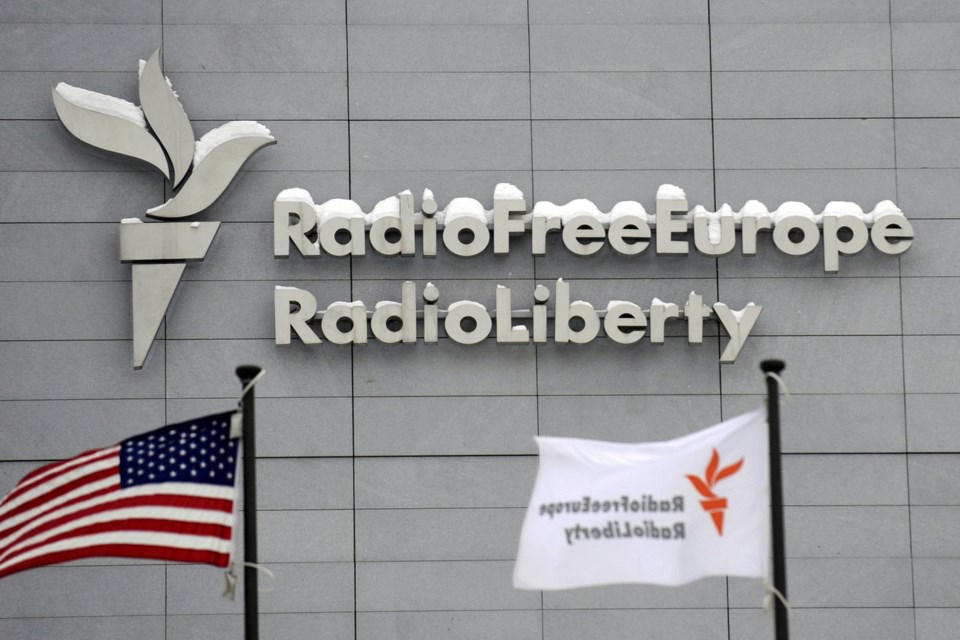In the early days of Israel's , U.S.-operated Radio Farda, which broadcasts in the Persian language in Iran, debunked a state media report that an Israeli pilot had been shot down and captured.
Its journalism has continued despite the Trump administration's threat to its future, along with a Persian-language television outlet run by Voice of America.
Radio Farda, a branch of Radio Free Europe/Radio Liberty and based in Prague, has continued broadcasting even though its managing editor estimated that more than half of its staff had been furloughed. VOA's Persian staff, ordered to go on administrative leave in March, was suddenly ordered back to work Friday afternoon.
“We've been giving information to Iranians minute by minute about the conflict,” said Golnaz Esfandiari, managing editor of Radio Farda. That includes explanatory stories about Iran's nuclear program and short videos posted on social media, she said.
Several Iranians have contacted the radio network to express appreciation for reporting that they do not get on Iranian state media, she said. Traffic to its website was up 77% on Friday compared with the 30-day average. At the same time, families in Iran of five Radio Farda staff members have been pressured by people in the government who want to see the broadcasts stopped, she said.
Through the U.S. Agency for Global Media, the Trump administration has sought to the government-funded outlets that provide news reports to countries where there isn't a tradition of free press. The administration says these services
Both Voice of America and Radio Free Europe/Radio Liberty are in court.
Employees at Voice of America's Persian service were notified in an email Friday from Crystal Thomas, the U.S. Agency for Global Media's human resources director, that they were being recalled and needed to report to work immediately.
Kari Lake, who is running that agency, told Fox ������� that “we are ramping up — as we've always planned to do — to meet this historic moment.”
One person who got that email was at the office within three hours and worked until midnight, helping to put out a one-hour broadcast, said the employee, who spoke on condition of anonymity because the person was not authorized to speak to the press. About 50 people have returned to work. Voice of America is banned in Iran, but many of its citizens find ways through the internet to bypass the ban.
Voice of America's broadcasts — and social media posts — have become a challenge to produce because the administration has canceled subscriptions to news services like The Associated Press, Reuters and Agence France-Presse, said a second employee, who also spoke on condition of anonymity.
For the employees, it's a stressful time, putting out urgent news reports without any sense of how long — or whether — they will continue to have a job.
“I'm grateful they've brought back our Persian service to continue their role as a trusted voice covering the region for the Iranian people,” said Patsy Widakuswara, VOA's White House correspondent, who is a plaintiff in the court fight to keep the agency alive.
“But why smash a working system only to cobble it back together when you realize you need it?” Widakuswara asked. “And how many crises would it take for them to realize that all VOA language services are important — before, after and during breaking news?”
During video reports posted online this week, a Voice of America anchor explained where Iranian counterattacks were landing in Israel, and how Iranians were trying to send out information about what is happening through social media.
The danger for a service like VOA, having been off the air and off social media for more than two months, is that Iranian citizens will become accustomed to looking elsewhere for news, said Tom Kent, a media consultant and former president of Radio Free Europe/Radio Liberty.
“You would hope that people would learn from this that international broadcasting cannot be turned on and off like a lightbulb,” said Kent, also a former AP editor.
Despite on its headquarters Monday while the Republic of Iran ������� Network was broadcasting live, the state-run news service is still operating.
Radio Farda has stayed on the air despite cutbacks. It also continues to have access to news services like the AP, but those contracts will expire at the end of the month, Esfandiari said. Three people have been brought back from furlough to help cover the war, she said.
She said she hopes the conflict lets people who question the service's existence know its value.
“It's an information war, absolutely,” Esfandiari said. “These countries — Iran, Russia and China — would be very happy if we were gone.”
One of the VOA employees called back to work said they have not been told how long it will be for. Despite evidence this week that someone in the administration saw value in what they do, might they still lose their job eventually?
“I don't want to think about that,” the person said.
___
This story has been corrected to reflect the name of Radio Farda’s managing editor, Golnaz Esfandiari, not Golnaz Esfandiani.
___
The Associated Press' Jon Gambrell and Kamran Jebreili contributed to this report. David Bauder writes about the intersection of media and entertainment for the AP. Follow him at and .
David Bauder, The Associated Press



